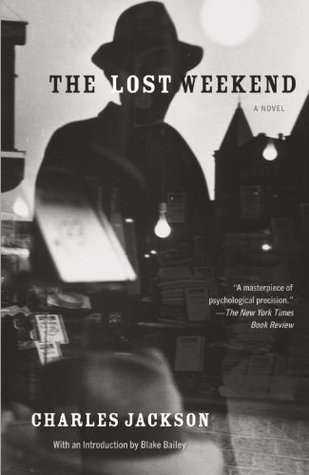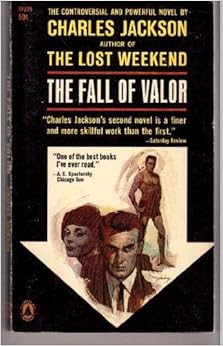Similarly,The Lost Weekend is remembered today, if it is remembered at all, as an Oscar winning 1945 film directed by Billy Wilder and starring Ray Milland as a struggling and not so young anymore writer on a harrowing, five-day drinking binge in Manhattan.
The even harder hitting novel The Lost Weekend by Charles Jackson, upon which the movie is based, was published seventy years ago this month, in January 1944. The Lost Weekend sold a half million copies in its first few years of publication, was translated into several languages, and made its author famous, at least for awhile.
Jackson and his novel have recently emerged from the shadows. Vintage Books has brought out a trade paperback edition ofThe Lost Weekend. Also, a superb biography of Jackson -- Farther and Wilder: The Lost Weekends and Literary Dreams of Charles Jackson -- by Blake Bailey was published by Alfred A. Knopf.
 |
| The Lost Weekend, First Vintage Books edition, 2013. |
Adam Kirsch of the Wall Street Journal says that with Farther and Wilder "Mr. Bailey has managed to turn such an unpromising subject into a brilliant and gripping book."
The Lost Weekend is an episodic and relatively brief story of a writer named Don Birnam -- middle class, dapper, cultivated -- hitting bottom. The terrors and humiliations of his alcoholism are searingly depicted. Absent are the established associations of boozing with humor or cocktail hour sophistication. In the course of the novel Don Birnam steals a woman's purse to get money to buy alcohol, tries to pawn his typewriter to get money to buy alcohol, wets his pants, falls down stairs, winds up in a hospital's drying out ward, and, in the book's climactic scene, suffers through horrifying hallucinations. All the while Birnam's feelings bounce between self-loathing and smug superiority.
 |
| Charles Jackson |
Because the novel was seen as a lightly fictionalized memoir, Jackson, whose previous work as a writer consisted of a few published short stories and scripting a radio soap opera, was instantly propelled to fame as an authority on overcoming addiction. Preferring to be considered a talented fiction writer rather than an ex-drunk with a well-told recovery story, Jackson initially claimed that no more than one third of Don Birnam's story was taken from his own life. Later he admitted that almost all of the book was autobiographical.
 |
| Poster for movie "that dares to open the strange and savage pages of a shocking best-seller." |
In the meantime, Jackson went to Hollywood to help write scripts for MGM. Jackson's extraordinary charm won him many friends in the movie colony. He was especially sought out by those, such as Spencer Tracy and Robert Benchley, who were coping with their own drinking problems. Despite having a wife and two children settled on a farm in New Hampshire, Jackson -- bald, bespectacled, and in his early forties -- carried on a romantic flirtation with the young Judy Garland.
 |
| The Fall of Valor, Jackson's second most famous novel, 1964 paperback edition. |
Jackson became addicted to prescription drugs, eventually drifted back into alcoholism, and was often hospitalized. He separated from his extraordinarily patient wife, Rhoda, the model for the girlfriend character, Helen, in The Lost Weekend (played by Jane Wyman in film version). In the mid-1960s Jackson took up residence with a young man at New York's legendarily bohemian Chelsea Hotel. In September 1968, Jackson committed suicide by drug overdose. He was sixty-five.
Farther and Wilder, Bailey's biography of Jackson, takes its title from a grand opus of a novel that Jackson toiled on for years but left unfinished. Jackson himself had taken the phrase from his friend Thomas Mann's novel Doctor Faustus.
Bailey, who has written a biography of Richard Yates (A Tragic Honesty: The Life and Work of Richard Yates) and a National Book Critics Circle Award winning biography of John Cheever (Cheever: A Life), did not start out to write a full-scale biography of Jackson. "When I first considered writing about Charlie, I thought he would be one of several short profiles in a book about forgotten writers," Bailey explained to The Committee Room. "I'd encountered a number of these in my research on John Cheever and Richard Yates: Nathan Asch, Calvin Kentfield, Flannery Lewis. Any of these names ring a bell? No? Well, they were considered awfully promising in their time, and now you can hardly Google them."
 |
| Blake Bailey (photo by Mary Brinkmeyer). |
Jackson's two daughters, now in their seventies, cooperated with Bailey's research. Their mostly happy memories of a kind, concerned father who carefully shielded his children from the unsavory side of his life, add an important layer to Bailey's portrait of the complex Jackson. Bailey says that the daughters were "maybe a little" surprised that someone was interested in writing a book about their father but it wasn't the first time they had been approached. "A very able professor at Syracuse University had wanted to write a biography about fifteen years ago, but they decided not to cooperate," Bailey explained to TCR. "I think they were afraid that an academic would overemphasize their father's homosexuality, and he'd be relegated to a Queer Studies niche in academia. Such an outcome, I hasten to add, is a lot better than total oblivion, but the daughters can be forgiven for wanting a more catholic following for their father's work,"
 |
| The Sunnier Side and Other Stories, 2013 Vintage Books Edition. |
Here's more information --
Blake Bailey. "Weekend in the Sun" (Charles Jackson in Hollywood). Vanity Fair. March 2013.
Mark Connelly. Deadly Closets: The Fiction of Charles Jackson. University Press of America, 2001.
Ian Crouch. "The Book that Will Make You Never Want to Drink Again." The New Yorker. 10 July 2013.
James Daubs. "Hammered in the Closet: The Gay Novels of Lost Weekend Author Charles Jackson." Punchnel's.
Irene Lacher. "Sunday Conversation: Blake Bailey Rediscovers 'Lost Weekend' Author." Los Angeles Times. 19 April 2013.
Donna Rifkind. "The Lost Novelist." New York Times. 19 April 2013.
The Committee Room. Time Spent with TCR is Never Wasted.


Salam all. Yuk gabung segera di bandar bola terbaik dan terpercaya 2018 ^_^ dan tidak ketinggalan juga loh banyak bonus di www.maxisbola.com
ReplyDeleteNikmati berbagai keuntungan bermain di
BONUS DEPOSIT PERTAMA 30%
1 Min deposit : IDR 500.000
2 Max bonus : IDR 2.000.000
3 Kode bonus : MSB30
4 Melakukan turnover 10 kali dari total deposit di tambah bonus
contoh depo 200+100 = 400x10 = 4.000 turn over yang harus di capai
5 Promo ini khusus member baru dan deposit pertama
6 Hasil Seri, bertaruh di dua sisi, dibatalkan atau ditarik dikeluarkan dari perhitungan turnover
7 Semua taruhan di luar SPORTBOOK tidak di hitung dalam turn over
8 Bonus dan kemenangan akan di tarik jika target turn over tidak tercapai terhitung dari tanggal deposit atau ada teridentifkasi kecurangan dalam ip address, nomor rekening, nama rekening.
9. Maxisbet berhak membatalkan promo ini kapan saja , baik untuk semua pemain atau pemain individu
"The Lost Weekend" by Charles Jackson is one of the most favorite novel of my team in https://uk.edubirdie.com/law-essay-writing . So, I'm very happy that you decided to write a review on it.
ReplyDeleteWell Written and Structured Blog. Totally a fan of your writing, I found this blog unique and i have been going through the posts in your blog. Independence Day in Tamil
ReplyDeleteA very interesting article, I think your writing skills are at an incredible level, keep it up. Please check my health blog: www.hghtherapydoctor.us.
ReplyDeleteIt is an extraordinary site.. The Design looks great.. Continue working like that!. Showbox APK Latest Version 5.14 Download
ReplyDeleteLooks like a good novel. However, I will try to read it as soon as possible so that I may have idea about the content that you have shared here.
ReplyDeletenice information bro togel online
ReplyDelete
ReplyDeleteescort service phone number in kolkata
escort service phone number kolkata
kolkata escort
escort service in kolkata
escort service kolkata
kolkata escort service
escort kolkata
kolkata shemale escort
escort in kolkata
escort services in kolkata
kolkata escort services
cheap escort services in kolkata
Thank you for sharing these stories.
ReplyDeleteThere are many reasons that might prevent you from signing in email normally, hotmail com login is created to help you solve all sign in problem.
Very good information. Lucky me I came across your website by
ReplyDeleteaccident (stumbleupon). I’ve saved as a favorite for lat This is my first time pay a visit at here and i am actually impressed to read all at alone place.
ReplyDeleteHello, I'm interested in reading your new blog because it's brand new. I hope you'll want to read this blog when you see it. I'm familiar with another service named Case Study Writing Help Service, through which I may perform all academic work.